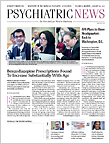The misfiring of the brain’s control system for habits may be a reason for compulsions in obsessive-compulsive disorder (OCD), suggests a study published December 22, 2014, in AJP in Advance.
Researchers in the departments of psychiatry and psychology at Cambridge Behavioural and Clinical Neuroscience Institute and New York University performed magnetic resonance imagining (MRI) scans on the brains of 70 people with and without OCD to determine whether an association existed between symptoms of OCD and abnormal brain activation in the caudate nucleus, a structure in the basal ganglia that must fire correctly for one to control his or her habits.
According to the researchers, it was a widely accepted hypothesis that symptoms of OCD stemmed solely from regions of the brain—such as the medial orbitofrontal cortex—that control worrying or fearing that something is incomplete (goal-oriented behavior), but the current study shows that another pathophysiological process could be involved.
To access how a system for habit contributes OCD-like symptoms, the patients—while receiving scans—were asked to press a pedal, a part of a pedal-pressing behavioral test, to avoid shock to the wrist over an extended time. In the final stage of testing, the shock block was removed to assess whether the pedal-pressing behaviors of the patients could be discontinued.
The researchers found that patients with OCD were less capable of stopping their pedal-pressing habits than the control group. In addition, individuals in the OCD cohort were more likely to have hyperactivation in the caudate nucleus after the shock block was removed, compared with those without OCD. Though the researchers observed hyperactivation in the medial orbitofrontal cortex during shock avoidance, it did not directly relate to habit formation.
The study’s lead author, Claire Gillian, Ph.D., a professor of psychology at New York University, stated that the findings may not be specific to OCD and that habits may underpin symptoms of many psychiatric conditions. “There is a range of human behaviors that are now considered examples of compulsivity, including drug and alcohol abuse and binge eating. What all these behaviors have in common is the loss of top-down control, perhaps due to miscommunication between regions that control our habits and those such as the prefrontal cortex that normally help control volitional behavior. As compulsive behaviors become more ingrained over time, our intentions play less and less of a role in what we actually do,” she said.
Based on the current finding, the researchers plan to focus on therapeutic strategies that will target symptoms of OCD through regulation of the caudate nucleus. ■
An abstract of “Functional Neuroimaging of Avoidance Habits in Obsessive-Compulsive Disorder” can be accessed
here.

